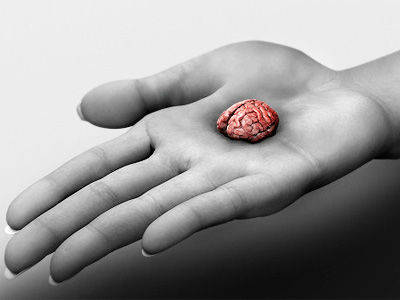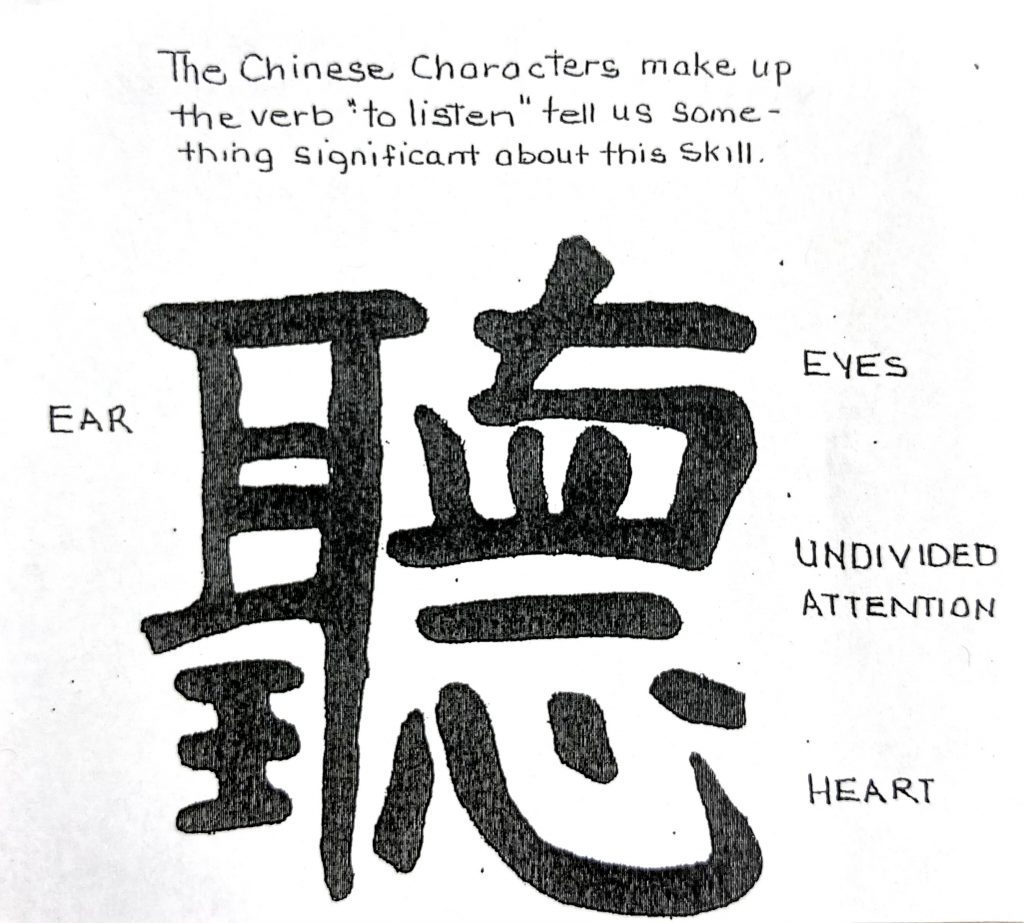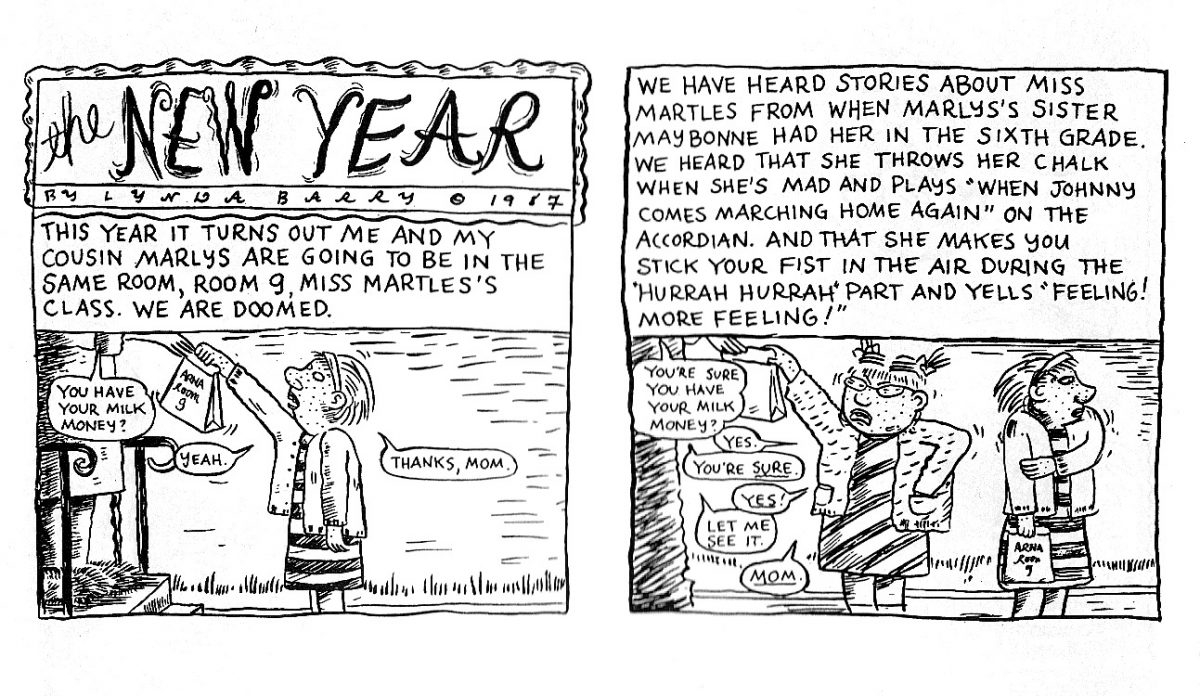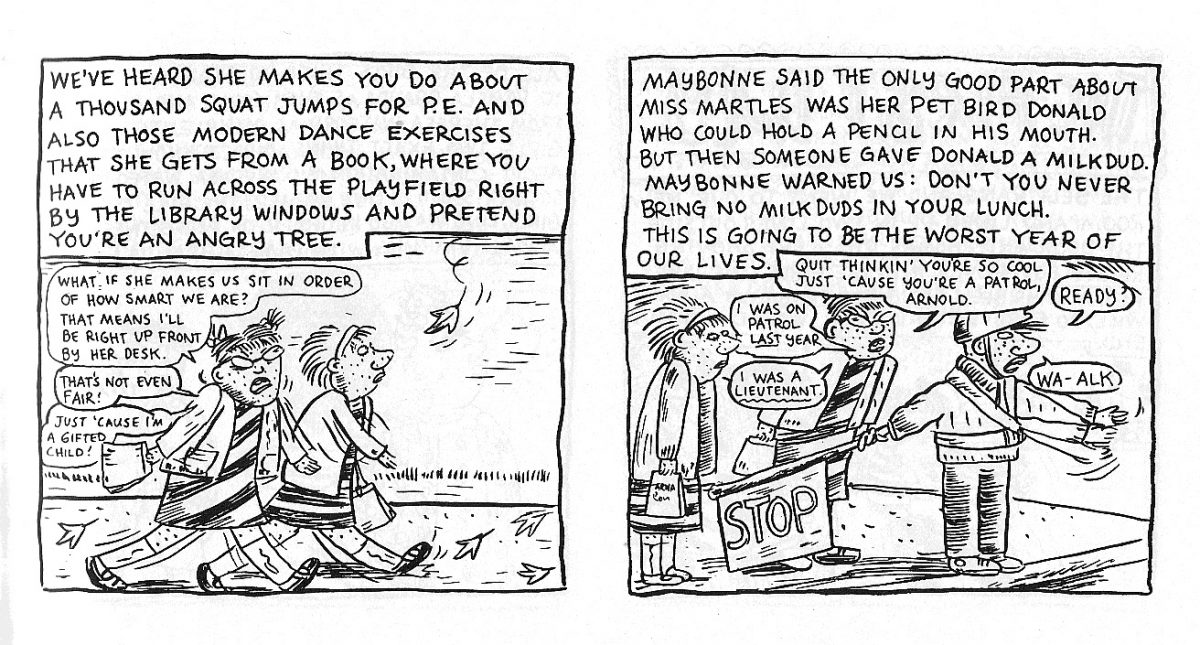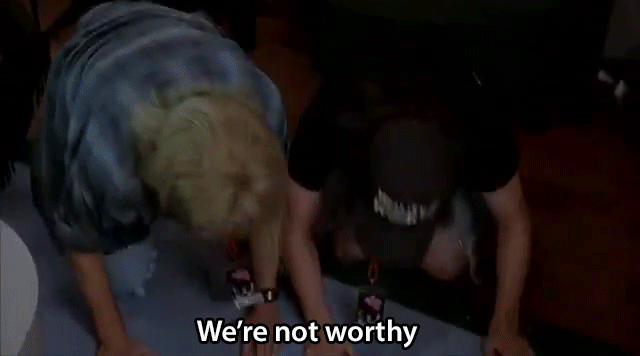The link to our graphic novel of awesomeness, adapted from A Wizard of Earthsea, by Ursula K. Le Guin, can be found here. Enjoy!
Presences All Around Us

Mám Éan, Connemara
For your Pro-D day, you’re going to spend a little time with an old friend of our Grade 7s, John O’Donohue. Grade 7s, you might remember that we listened to a CBC podcast with him last year – what Tapestry host, Mary Hynes said was “the single-most requested interview we’ve ever broadcast.”
This term, we have been exploring the work of Ojibway writer (and former Burnaby resident!) Richard Wagamese. As you may have discovered, one of the Big Ideas in Wagamese’s work is that of connecting to place: connecting to the land and the landscape; learning from the natural world. We also know that in A Wizard of Earthsea, the specifics of place play a big role in the development of the story; and I’ve asked you to make that a strong focus in the planning for your graphic novel work – how do you convey the specific character of the place(s) in your chapter?
The below task is in aid of developing our idea of the nature of place, which is a Big Idea in our Social Studies work this year.
Your work is to listen to this recording of John O’Donohue hiking up Mám Éan Mountain in Connemara, in western Ireland. While you listen, you’ll record your thoughts and then share your ideas in class next week, but first, please read the below instructions carefully.
1. The recording is about 45 minutes long – depending on your capacity right now to listen for extended periods of time, you may want to divide the listening into two shorter sessions. At just after the 24:00 mark, the audio repeats itself for about a minute (up to the 25:20 mark), so that might be a natural spot to take a break, if you find you need one.
2. While you listen, please use your large paper to draw and write as you go. This can be like sketchnoting; it can also be like drawing images that come into your mind and writing down words or phrases that you like or that have meaning to you. You might consider doodling in the margins while you listen, if that helps you stay engaged. Basically, draw and write what you hear.
There is a “transcript” button on the Youtube page, which will pull up a very rough, error-prone AI-generated transcript in the Comments box. You don’t have to use this, but you can if you like. If you were not at school on Thursday, use paper from home, or your comp book.
3. After you listen to the whole recording, take some time to generate ideas about the below. If you have space, add those ideas to the front of your paper; if you don’t have space on the front, add them to the back:
- What did you think was interesting?
- What questions do you have? What didn’t you understand and/or what question(s) might be fun or interesting to ask in a class discussion?
- How is what O’Donohue shared connected to what you have learned so far about Wagamese?
- How might what you have heard from O’Donohue influence your work on A Wizard of Earthsea?
- How does this change the way you think about and/or experience the landscape around you?
- How does this changes the way you think about the landscape within you?
- Why – for you, or for the world – might his way of thinking might be useful or meaningful?
Here are a few bits of vocab that might be useful to know before you begin:
Nonchalant – having an air of easy unconcern or indifference
Zen – a state of calm attentiveness in which one’s actions are guided by intuition rather than by conscious effort (related to Zen Buddhism)
Bog – a poorly drained usually acid area rich in accumulated plant material
Cadence – a rhythmic sequence or flow of sounds
The Twelve Bens – a mountain range in Connemara
Pathos – an element in experience or in artistic representation evoking pity or compassion
Anonymous – of unknown authorship or origin; lacking individuality or distinction
Cutting turf – in the past, Irish people heated their homes and cooked their food using turf taken from from the bog as fuel. Turf was cut from the bog by hand, using a two-sided spade called a sleán.
Sod – the grass-covered surface ground layer
Karl Marx – a socialist revolutionary
Dialectic – discussion and reasoning by dialogue as a method of intellectual investigation
If you are able to, after you listen, go back outside and take a look around. If you are able to go to a place where you can see the North Shore mountains, do that, too.
How has your perspective shifted? What do you see now that you didn’t before?
I go among trees and sit still.
All my stirring becomes quiet
Around me like circles on water.
My tasks lie in their places
Where I left them, asleep like cattle…
Then what I am afraid of comes.
I live for a while in its sight.
What I fear in it leaves it,
And the fear of it leaves me.
It sings, and I hear its song.
~ Wendell Berry

The Mám Éan Pilgrimage Walk

“Moon Over Maam Valley,” by Fergus Bourke
Due to Technical Difficulties…
…your Homework Sheet™ for January 19 is posted here:
Reflection: dig into this vital part of the writing process: editing. This is where master writers spend the bulk of their time.
If you received peer feedback—you don’t have to use every idea you received; you do need to consider why you received each piece of advice: what was unclear that prompted the feedback?
If you opted not to share your work—who can help give you feedback?
Things to consider as you edit:
- Word choice—especially verbs, adjectives, and adverbs
- Image building in your stories—take your time; focus on the meaningful details; consider how your outer experience and inner experience affected each other in each story
- The Le Guin Challenge: how are you applying that learning?
Final copies due next Friday. Notice this gives you time to really sink into the editing and redrafting process.
Reading/Writing: we will discuss “Constantine in the Garden”/”1935” and “The Stars Over Newark”/”1949” on Monday. I will collect your graphic organizers then, too.
A Wizard of Earthsea: spend some more time with the chapter summaries—what is grabbing your interest?
Ensure you have fully reread the project outline—what questions do you need to ask in order to clarify the process?
D&D Club: we will meet this Tuesday. Please bring in your signed permission forms for Monday, and please make sure your parents know they will be picking you up at 5:00 on Tuesday.
Next Week: we will be jumping in to learning and action next week, so please arrive rested and focused. Consider what we learned today from Swiatek and Andreeva in terms of how to manage the struggle to find success. You might consider watching some of the Australian Open this weekend to gain inspiration for the coming weeks (and for 6-Square!).
New Job Posting
NEW JOB POSTING: The MACC Mini-Brain!
There is a new position opening up in the Capitol Hill MACC 6/7 program: the MACC Mini-Brain.
The Mini-Brain is a job similar to “class president.” The role of the Mini-Brain is to be the teacher when Prof. Wu Wei isn’t in the room or when he doesn’t feel like being the teacher. The Mini-Brain is to Prof. Wu Wei as Robin is to Batman. The Mini-Brain is a natural leader, fair and kind, and helps shape policies that affect the lives of the students of Division 3.
MACC Mini-Brain Job Description
Duties:
- Forms government of choice
- Helps individuals and the class as a whole honor the Class Agreement
- Holds bi-weekly Town Hall meetings to share policy decisions and hear the concerns of constituents
- Serves as Prof. Wu Wei’s Butler
- At the end of each day, writes tomorrow’s date on the board in English, French, and Chinese
- Helps Prof. Wu Wei make decisions, such as:
- what activities to do for D.P.A.
- when to take breaks
- what movie to watch for the end of term celebration
- things he doesn’t want to think about
- Creatively diverts people’s attention when they notice how messy Prof. Wu Wei’s desks are getting
- Controls the class jobs basket
- Helps classmates solve minor conflicts
- Holds the tie-breaking vote in the case of a tie in class votes
- Reminds people to do their jobs
- Welcomes guests to the room and helps make TOCs’ lives bearable
- Politely corrects Prof. Wu Wei’s spelling errors
- Sighs wearily at the P.A. system when there are too many announcements (eye-rolling optional)
- Other duties as they arise
Term: One month
Mandatory Skills/Assets: a personalized combination of some of the following traits:
- Responsible
- Wise
- Empathetic
- Understanding
- Supportive
- Diplomatic
- Energetic
- Decisive
- Disciplined
- Intelligent
- Active
- Hard-working
- Ethical
- Aware
- Patient
- Honest
- Good listener
- Cooperative
- Respectful
- Passionate
- Collaborative
- Positive
- Efficient
- Charismatic
- Selfless
- Brave
- Humorous
- Loyal
- Strategic
- Encouraging
- Unbiased
- Influential
- Democratic
- Inclusive
- Eco-friendly
- Grateful
- Reasonable
- Optimistic
- Accepting
- Mentally stable
- Friendly
- Loving
- Helpful
- Kind
- Caring
- Fair
- Mature
- Incorruptible
- Thoughtful
- Prudent
- Balanced
- Attentive
- Equanimous
- Observant
- Peaceful
- Truthful
- Clear
- Logical
- Health-conscious
- Careful
- Calm
- Agreeable
Hello, Leaders of Tomorrow. Welcome to your first campaign.
For a combination of Career Education, Social Studies, Writing, Math, and Art learning, you will each create a project to determine the first MACC Mini-Brain!
Remember that letter and package from President Obama that we explored? For the Campaign for Mini-Brain project, you will each create your own version of that document. It will contain:
- A campaign poster, done on 8.5 x 11 paper or cardstock. This can be a self-portrait, like the photo of President Obama that was in the package we explored, or an eye-catching and meaningful visual, or some combination of those two representations, with a catchy and persuasive slogan.
- Creative choice: remember the bios of the two Obama dogs? What would you use on this third page to humanize yourself, grab our hearts, and tell us more about your values?
- A written interview, in which you answer the same questions that President Obama answered, with the idea of being truthful and showing your personality, but also trying to win our votes.
- A persuasive essay, explaining why you should be the first MACC Mini-Brain. In this essay, you will try to win our votes by explaining how and why you best fit the Mini-Brain job description. On Campaign Day, you will deliver this speech to the class.
Big Idea: Clarity of Communication—what am I doing, visually, verbally, and textually, to make my values clear and persuade my public?
First steps:
- Choose the three leadership qualities from our class-generated list that you think you most naturally inhabit.
- Decide upon your vision: what do you stand for? What is your version of the ideal Room 105? How will you lead us there?
Remember: all aspects of a political campaign have been extremely well thought out—everything is there for a reason, working to shape the public’s opinion. Even the most casual-seeming of choices have been tested and planned. With each choice you make, ask, Why? How does this contribute to my message?
Also remember: there is no one way of being an effective leader, and there are not leaders and non-leaders; leadership potential exists inside us all, and there are an infinite variety of ways of expressing it—what’s yours?
The Mini-Brain is not an idealized you, but the best of the authentic, quirky, non-performative, individual you, showing us the way.
Good luck!
Quirks and Quarks! Quirks and Quarks! I’m Gonna Get Me Some Quirks and Quarks!
As advertised on your Homework Sheet™, the link to the Quirks and Quarks podcast can be found be clicking here.
1. Before you begin, prepare the space around you:
- remove all external distractions (phone, toys, little sisters, etc.)
- close all open tabs on your computer except this one
- remind yourself that Discord will still exist when you are done: you don’t need to check it every five seconds
- let your family know you are engaging in an activity that requires focus
2. Then prepare your materials:
- get out your paper and sharpen your pencil
- clear off your workspace
- prepare the paper with your containers:
Big Idea (big text and big container): Scientific Advancements
Sub-Topics (medium-sized text and medium-sized containers):
- Climate Change
- Human Evolution
- Expansion of Universe
- Space Exploration
- HIV/AIDS
- Questions
3. Draw lines to connect your Sub-Topics to your Big Idea (you can choose to connect the Questions container to the Big Idea, or have it on its own in a corner of the page).
4. Prepare your inner world: take a purposeful moment to become calm, friendly, and still in your inner world, so that you can receive information.
5. Read these instructions all the way through to the end.
6. Take another purposeful moment to become calm and friendly.
7. Press play.
A reminder that the first few minutes of the podcast is an introduction–please do listen to it, but no need to take notes. Listen for when they start to discuss the first Sub-Topic, Climate Change.
Be an active note taker. Use the Pause and Rewind (back 15 seconds) buttons liberally (a lot).
No full sentences–try to use as few words as possible for each Detail; abbreviations, symbols, and pictures can help with this.
You don’t have to write down everything – listen for the key information.
Use “chains” to break down long ideas.
Cluster the Important Details around the Sub-Topic they relate to; connect them to the Sub-Topic with lines.
There will be some complex information in here that you may not understand–what can you get a rough sense of by context (the words and ideas that surround the tricky idea), and when do you need to press Pause and look something up in order to understand and move on?
Write down questions that occur to you around the Questions container and connect them to the container with lines. Questions can be things you don’t understand, things you want to know more about, or questions about how this information impacts other knowledge and ideas.
8. When you have completed the web: this is when the real work happens: take time to look at the web as a whole, and begin to make connections from detail to detail across the web. What patterns are revealed?
As we have done in class with our Listening web, these can be concrete connections (“It says ‘inner voice’ here and it says ‘inner voice’ there”) or connections that required critical and/or creative thinking skills.
You can use color to show these different types of connections, or you can use different kinds of lines.
Give yourself plenty of time for this final step.
9. Reread the criteria and consider your work. Have you missed any key aspects of the criteria.
10. Do something nice for yourself.
Criteria:
- Hierarchy of Size: Big Ideas are BIG, Sub-Topics are Medium, Details are small
- Organization: details are clustered around the Sub-Topic they are related to
- Use of Fewest Number of Words to Capture the Idea, and Use of Your Own Words: no full sentences, break down long ideas into a chain of related details, if needed; if it is a quote, put it in quotation marks
- Connections: lines showing concrete connections across the web; and lines showing deeper connections across the web
- Attempt at Thoroughness: do not write down everything they say; do write down enough so that you could use the web to recall the information and explain it to someone else
Good luck!
“Listening is an act of community”
When I first started teaching in the MACC program at Suncrest in 2016 (if you didn’t know or couldn’t tell by looking at [what’s left of] my hair, MACC-teacher years are similar to dog years, which makes me old), the school counsellor, the indomitable Ms. Tahara, gave me this card, as a tool to use with students:
I’ve had it pinned up with a magnet on the whiteboard in both classrooms, Suncrest and Cap Hill, ever since, and every once in a while I have looked at it and had a variety of reactions, ranging from inspiration to, after particularly challenging days, deep, wistful sighs. But earlier this week, as I was preparing the class for the transition into the new year, I saw it again, and it helped tie together a few things that have been floating around in my consciousness over the past couple of months, as I have lain out on a log at the high tide line in Qualicum each night, watching the stars and listening to all the different moods and messages of the ocean.
(which of course makes me think of this old favorite from Room 105, which was born of close listening; this book was a great read this summer)
I am curious about this act of listening, MACC-sters, and it may form a big part of our learning this year.
In a classroom setting, we tend to think about listening as not talking when someone else is talking (which is a great start!), but I wonder what else is actually involved – are there different types of listening? How does listening actually help us, aside from as a performative act for a teacher whom we know gives listening a 50% weight in Oral Language assessment? How does it help us as scholars, beyond Language Arts? How does it help us as young (and old) humanoids, in our relations with others and in our relation to ourselves?
What happens when we listen to nature?
What do we have to learn from listening to the Universe?
What sounds exist in silence?
How does listening help us find and sustain concentration and equanimity? (PS: Equanimity may be one of our Words of the Year – if you want a jumpstart, look it up!)
What does it mean to listen to your inner voice? How does that actually work? How does it help us?
(BTW, one of my teachers introduced this idea this month – that only 43% of our bodies are actually made of human cells; the rest are “microbial colonists,” which is equal parts fascinating and disgusting. Given that this is true, does it make us think about that “inner voice” a little differently? Who the heck are we listening to?!?)
Master writer Ursula K. Le Guin, whose work we will explore this year, said in a talk called “The Operating Instructions” that she gave to Oregon Literary Arts, “Listening is an act of community, which takes space, time, and silence.”
How will listening help us build our class community together – ideally, a place where each of us feels deeply and truly seen, understood, and accepted for who we are? Le Guin says:
“People unite themselves and give each other parts of themselves – inner parts, mental not bodily parts – when they talk and listen. Two people talking [in this way] form a community of two. People are also able to form communities of many, through sending and receiving bits of ourselves and others back and forth continually – through, in other words, talking and listening.
Talking and listening are ultimately the same thing.”
(That’s from her essay “Telling is listening,” which I totally don’t get yet but I have a book on order from the library that will hopefully provide some clues.)
(One tool we will use to develop and nurture these skills of giving and receiving is a revival of a longstanding-but-last-year-neglected Room 105 practice, the Socratic Circle!)
Looking at the same idea from a different angle, Le Guin tells us that “Reading is listening,” which makes me think about the tangible energy that is in the room whenever we are reading a great book together, and the fierce, otherworldly concentration you see on someone’s face when they are curled up with a good book, in conversation with the author, totally transported to a different time and place.
She also says that in order for humanity to makes its way out of the climate and tech crises we find ourselves in, we need to start listening to voices that before now have been minimalized or ignored:
And finally, she shares her experience of writing as listening:
I wonder if you have had that experience – when the words just come to you when you are writing, rather than grasping or searching for them or, worst of all, thinking hard? I wonder if we can find ways this year to make that a more-often-than-not experience?
This connects to an obsession of mine from a few years back that resurfaced over the summer (annoyingly, to play, you need to click on “Watch on YouTube”, or just click here):
The Lucerne Festival Orchestra was known as the best pick-up band in the world: the musicians came together just for the festival each year, handpicked by the conductor, Claudio Abbado, from the best orchestras and ensembles in Europe (as well as some of the world’s best soloists, like clarinetist Sabine Meyer and flutist Emmanuel Pahud), brought together by a love of the music and a love of this particular maestro.
From what I’ve read, Abbado’s vocal instructions to the orchestra during rehearsals consisted almost entirely of one word: “Listen.” To each other, to the music, to the space between the notes: “listen.”
That is something I am going to be encouraging you all to do this year: to listen. To each other, to yourselves, to the silence between things – with your ears and your eyes and your heart, with undivided attention, so that we can give and receive and build community in dialogue with each other. This will require a certain mindset, one that we spent a lot of time exploring last year and that we will explore again in the months to come. Grade 7s, remember Lynda Barry’s advice regarding attracting images – that it requires the same sense of calm friendliness one would use when faced with a shy forest animal that you wanted to encourage to come closer. It is something we do in our inner world that influences the material world around us.
If you watch the Abbado video, you will see evidence of that mindset and you will see the deep listening that is happening, both on the podium and in the orchestra. Notice he doesn’t use a score. Practice + relaxation + openness is what we are after, and real, active listening is the clearest and surest path there.
For those who have the time and are so inclined, go for it: watch the whole thing. (And if you want to go deeper into your understanding of what Mahler was intending, take a look here.)
For those of you who are not so inclined or are too busy working on your 15,788th hour of Genshin Impact or Roblox or Valiant or Super Smash Bros. (or whatever it is that you all are into these days; personally, I have been going old school), please do watch the first opening minutes so you can see what I am referring to above, and so you can also see the wonderful sense of Abbado as Prospero, the sorcerer of Shakespeare’s The Tempest, casting his spell over the ocean of those strings. And then skip to the very end (about 1:24:45) and watch how the musicians relate to each other after the performance – the joy and friendliness and pleasure they take in each other and what they have, together, accomplished. Wouldn’t it be amazing if our class ended like that? Every day?
All of which is to say, floss those ear canals…:
and get ready to listen:
Also, it wouldn’t be September if I didn’t upload this:
(Lynda Barry, Down the Street, Harpercollins, 1988)
As always, I 100% promise not to throw chalk at anyone or play my accordion; and I 0% promise that there won’t be modern dance exercises outside the library windows. Start practicing your angry tree!
See you soon.
“Mistakes are actually the main reason to use this system in the first place”
“The question marks are our symbol. They stand for questions unanswered, mysteries unsolved, enigmas of all sorts that we attempt to unravel.”
– Jupiter Jones in “The Three Investigators and the Mystery of the Moaning Cave”
“Every year, when you’re a child, you become a different person. Generally it’s in the fall, when you re-enter school, take your place in a higher grade, leave behind the muddle and lethargy of the summer vacation. That’s when you register the change most sharply.”
– Alice Munro, “Child’s Play”
I would love to live
As a river flows,
Carried by the surprise
Of its own unfolding.
And so, the Great Adventure begins. My first question – to myself, and to you twenty-four humans who have the appearance of children – is, what it would be like to enter into our class with no expectations, no presuppositions, no clinging to past experiences and opinions and ways of being; but instead, to use that process that Alice Munro describes above as a stepping stone into an unfolding river of risk-taking, observation, and equanimity?
To that end, one of our guides this year will be the Goddess of All Things, AKA singer/songwriter/painter superstar Canadian Joni Mitchell. Your indoctrination into worship gentle guidance towards an appreciation of her talents begins here.
One of the many many many (many) ways in which Joni Mitchell changed the frequency of music and culture is her use of what are called “open tunings” for her guitar.
Standard tuning for the strings on a six-string guitar works like this: “EADGBE—three intervals of a fourth (low E to A, A to D and D to G), followed by a major third (G to B), followed by one more fourth (B to the high E)” [I’ve never played a guitar in my life and have only a vague sense of what that last quote means – but enough to get a rough idea of it and so move on, so thank you, Jeff Owens on fender.com].
Joni Mitchell threw that idea out the window and created a whole new soundscape of alternative tunings. Take a slow read of this (from “The Guitar Tuning Odyssey of Joni Mitchell,” by Jeffrey Pepper Rogers) (how’s that for a name?) and consider how what she has to say might serve as a metaphor for your life in class and your life in general:
So how does Mitchell discover the tunings and fingerings that create these expansive harmonies? Here’s how she described the process: “You’re twiddling and you find the tuning. Now the left hand has to learn where the chords are, because it’s a whole new ballpark, right? So you’re groping around, looking for where the chords are, using very simple shapes. Put it in a tuning and you’ve got four chords immediately—open, barre five, barre seven, and your higher octave, like half fingering on the 12th. Then you’ve got to find where the interesting colors are—that’s the exciting part.
“Sometimes I’ll tune to some piece of music and find [an open tuning] that way, sometimes I just find one going from one to another, and sometimes I’ll tune to the environment. Like ‘The Magdalene Laundries’ [from Turbulent Indigo; the tuning is B F# B E A E]: I tuned to the day in a certain place, taking the pitch of birdsongs and the general frequency sitting on a rock in that landscape.”
Mitchell likens her use of continually changing tunings to sitting down at a typewriter on which the letters are rearranged each day. It’s inevitable that you get lost and type some gibberish, and those mistakes are actually the main reason to use this system in the first place. “If you’re only working off what you know, then you can’t grow,” she said. “It’s only through error that discovery is made, and in order to discover you have to set up some sort of situation with a random element—a strange attractor, using contemporary physics terms. The more I can surprise myself, the more I’ll stay in this business, and the twiddling of the notes is one way to keep the pilgrimage going. You’re constantly pulling the rug out from under yourself, so you don’t get a chance to settle into any kind of formula.”
Joni Mitchell’s use of open tuning arose partially as compensation for a childhood bout of polio, which left the left side of her body (including her left hand, which forms the chords on a guitar) weakened, and partially, it seems to me, as a result of an innate deep restlessness and a natural tendency to question standards and norms and move toward the new.
In 2015, Joni Mitchell suffered a brain aneurysm that took away her ability to speak and walk. She had to teach her brain how to do these things again. And then she did something not even her doctors expected her to be able to do: she relearned how to play the guitar (by watching old videos of herself to see where her fingers went). Her doctors attributed her ability to do this to her natural will and grit, which are two words that it might be a good idea for us to investigate this year and find where they live within each of us.
On July 24, Joni made a surprise appearance at the Newport Folk Music Festival, and, among other wonders and delights, treated the audience to a guitar solo, the first time she had played guitar in front of an audience in 8660 days.
What are you willing to learn how to do over again this year? What are you will to risk “failing” at, being an infant again with, like Joni had to do with her guitar, in order to put it back together again in a new, different, deeper, more complex way?
Are you willing to evolve?
Hopefully you are beginning to get a sense of why Joni Mitchell, along with Bob Dylan, is widely considered the most influential singer-songwriter of all time (and she really considers herself to be a painter, first and foremost, and we haven’t even touched on that yet!). My secret plan hope is that by the end of this year you will understand why this is so, and that whenever anyone anywhere says the words “Joni Mitchell,” you will stop whenever it is that you are doing and reflexively do this:
In the meanwhile:
(Lynda Barry, Down the Street, Harpercollins, 1988)
As per usual, I 100% promise that there will be no throwing of chalk; and I 0% promise that there will be no forced modern dance outside the library windows. Start practicing your angry trees.
A Wizard of Earthsea Graphic Novel of Awesomeness
It was a loooooooooooooooooooooooooooooooooooooooooooo
ooooooooooooooooooooooooooooooooooooooooooooooooooo
ooooooooooooooooooooooooooooooooooooooooooooooooooo
ooooooooooooooooooooooooooooooooooooooooooooooooooo
ooooooooong journey, but we finally made it back to Iffish.
The link to the evidence of the trip we took together can be found by clicking here.
“Only in silence the word,
Only in dark the light,
Only in dying life:
Bright the hawk’s flight
On the empty sky.
—The Creation of Éa
You Didn’t Actually Think…
…that you’d have a whole week off with nothing to do, did you? (If you did, you haven’t been paying attention!)
Your response to this delayed start to the new year may have been somewhere on the continuum between
and
But, I have to be in school, so you know the drill…
You are about to receive some instructions. Remember that in order to read instructions with clarity, we need to prepare ourselves: remove distractions, external and internal, so that you can read in a calm, friendly, and curious way. Read all the way through, to get a general sense of things, and then reread each part as you do the work.
In truth, there are only two things I’d like you to do in these days leading up to January 10 – I leave the amount of time you put into these two things entirely up to you:
1. Warm up your hand. We are heading into graphic novel work, and you’ll want to get your drawing hand in shape. This can be done in any number of ways, including:
-
- drawing circles without a compass and not getting uptight when they don’t look perfect
- drawing straight lines without a ruler
- drawing a rectangle and then halving the rectangle (no rulers!) and then halving that space and halving that space, and so on, until you cannot go any further
- drawing the alphabet, slowly and precisely, all upper case and then all lower case, over and over and over, maintaining a sense of relaxed awareness
- copying images from Dazzler and/or Dazzler covers
- copying anything from Lynda Barry’s tumblr page
- copying faces from old high school year books
- copying this photo of Prof. Pai Mei as an adorable Halloween robot:
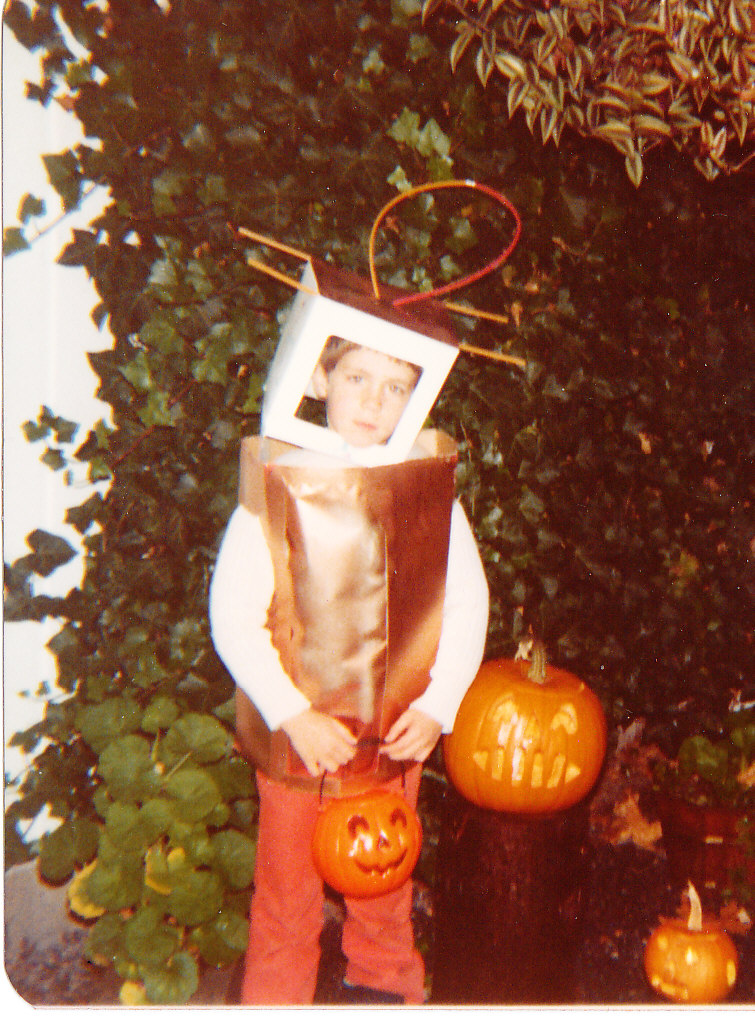
- copying any- and everything!
Also, spend at least 45 minutes coloring your House on Fire drawing, preferably with pencil crayons (if you have some at home – they don’t have to be the same colors you were using). Remember Lynda Barry’s instructions: spend time on it; try overlapping colors; use this as an exploration of color – what are you learning while you do it? You will use this learning in our graphic novel. See below for some ideas of what you do while you color.
2. Personal inquiry into MINDSET in general and CLARITY in particular. We’ve done a lot of work here already, and you’ve had a lot of warning that “we will be doing something with this!” We will start that “something on Monday. I’d like you to be ready for it.
We shall not cease from exploration
And the end of all our exploring
Will be to arrive where we started
And know the place for the first time.
~ T.S. Eliot, Four Quartets
Consider the exploration we have already engaged in:
- the notes you took on all the videos in the Mindset pages on this blog, and the discussions we’ve have about them in class
- notes taken while watching The Mind of a Chef, particularly the one’s that we related to mindset, such as “Get close to your opponent and dig the feeling” and the whole concept of ugly-beautiful and the perfectly imperfect, the perfectly “bent”
- your personal exploration into Taoism and the group work you did translating one of the verses from the Tao Te Ching
- discussions during our reading of A Wizard of Earthsea and the brainstorming you did in your comp book (if you were an obedient child) about the relevance of its content (how what we read matters to you and your life, how it might be useful to you, how it might have changed the way you think about yourself and others and the world)
- notes taken while reading Jeff Warren’s “Core Skills of Meditation and Practice“
- notes taken after meditations
- other things I can’t think of right now because I am old and tired – look in your comp book!
If you are looking in your comp book and noticing that your notes on these things are, well, a little thin, use these next few days to dive back in and beef things up. (For reals.)
For everyone, spend some time with those notes and start to look for patterns and connections and “A-ha!” moments. Write those ideas down.
Consider, too, some of the less explicit learning we have done:
- Clarity of communication in writing: what tools do we have at our disposal to help the reader get as close as possible to seeing and experiencing things as we have seen and experienced them? And what gets in the way of clarity when writing?
- Clarity of visual communication: in areas such as Math and Art and note-taking, what tools do we have at our disposal that can help make our thinking clear? What gets in the way of visual clarity?
- Clarity of oral communication: what have you noticed helps make thinking clear when speaking in class discussions, Socratic Circles, partner work, group work, and when delivering political speeches? What causes you to become less clear when sharing ideas? What have you noticed about other people and what makes their ideas particularly clear or unclear?
- What does it mean to listen with clarity?
- What does it mean to see with clarity? What is True Seeing?
- What does clarity look like in PE, as an individual and as a member of a team?
- Inner clarity – how do you know what you’re feeling? How do you knowing what you are thinking is true? How do you know if your experience at any given moment is subjective (true perhaps only from your point of view) or objective (true to an outside observer)?
- What does clarity look like relationally (between you and other people)? What does all of this look like in your social life?
These are all things that you can spend some time sitting with and recording thoughts about in your comp book. Avoid full sentences! Consider a web, or a mindmap, or sketchnotes (if you have that ability). Regardless, aim for thoroughness.
There are a few other things I’d like you to do, too.
1. Get your Burnaby Public Library card (or borrow your parent’s, and if no one has one, see if your parents can help you sign up for one!) and click here.
This will take you to the Oxford English Dictionary, which is the Grandaddy of all dictionaries.
Enter “clarity” in to the search window.
Spend some time with the definitions.
Then, go to the top-ish right of the page and click “Historical Thesaurus,” and then enter “clarity” into that search window.
Spend some time exploring this page – click on the red “clarity” in each result and explore the page that comes up. Make note of the synonyms (words that have the same or similar meaning to clarity) that appeal to you and/or that help change the way you think about the word “clarity.”
Spend time on this activity.
2. Explore a couple of the CEC newsletters. Each one contains an article written by one of the CEC instructors, exploring ideas that are directly related to mindset. Choose at least two to explore and use as a resource to add to your notes.
Please note that some of these articles may contain mature language and themes (nothing beyond what is covered in your Mature Reads permissions). Know yourself and know your family’s values: if you find yourself engaging in something that makes you uncomfortable or that you know would go against your family’s wishes, make another choice.
And then there are some optional ways to extend your thinking with this preparation, if you so wish.
Jeff Warren, cofounder of the CEC, talks about clarity here:
And then he leads a meditation (25 minutes!) around the idea, and then, at around the 40:40 mark answers some viewer’s questions.
And then he digs into clarity, in explicit and implicit ways, here:
And then he leads another mediation.
There are different ways of engaging in those videos:
- just listen to/watch the intro and closing discussions
- do the whole thing and try doing the mediation
- do the whole thing while you do your House on Fire coloring and take notes as they occur to you
- do the whole thing and draw your experience, adding notes (words) to the drawing as you go along
You could also try the same with this.
You might also consider continuing your exploration of the Tao Te Ching. Find an online source and explore some of the verses.
You could draw/note (or color your House on Fire) while listening to Obi Wan Kinobi read T.S. Eliot’s incredible poem, Four Quartets (warning: it may blow your mind):
Two Other Things:
1. Please make sure you know how to check your Outlook email (your school email account).
2. D&D Club (this is testing to see if you have actually read this entire post!):
If you are interested in possibly being part of the after-school D&D club, please send me an email, letting me know what your availability is on the following days of the week, from 3:00 to 5:00 p.m.: Tuesdays, Wednesdays, and Thursdays. Your email will tell me which days you are available on – please remember email etiquette when composing your message.
We will choose one of the above days of the week for the club to meet on, after I get a sense of people’s availability.
Things to note:
- The club will be limited to 6 people and priority will go to grade 7s as this is their final year.
- Members of the club will serve as DMs when/if we play in Term 3. This is a big responsibility that requires lots of extra work in terms of prep time, on top of regular school work. Ask yourself if you are ready for that. (We will also need two more students to serve as DMs, so if that is interesting to you but you are not available for the club, don’t worry).
- You must have your parents permission to join the club (you will need to be picked up at 5:00 p.m. on session days). Once we have settled on a day, a permission form will go home.
- Being in the club means taking on leadership responsibilities, and if you do not consistently demonstrate taking care of those responsibilities, you might be asked to leave the club. This means doing your homework. If you neglect homework during the week, you will be asked to not attend the club the following week. It this happens more than twice, you will be asked to leave the club and forfeit your right to be a DM in Term 3.
Looking forward to seeing you all soon. The classroom is very empty, with only Bruce Lee here to keep me company. He’s so… quiet…
PS: when you see this, please send up some smoke signals on Discord, alerting others as to its presence!

